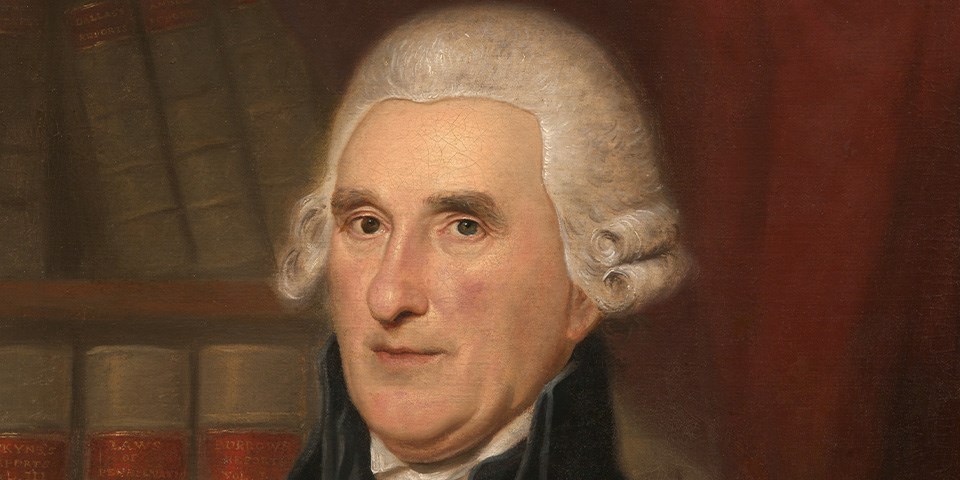Part of a series of articles titled The Constitutional Convention: A Day by Day Account for August 16 to 31, 1787.
Article
August 16, 1787: The Powers of Congress

National Portrait Gallery, Smithsonian Institution, https://npg.si.edu/object/npg_NPG.66.63?destination=node/63231%3Fedan_local%3D1%26edan_q%3Dthomas%252Bmckean
"The Convention is still sitting; nothing transpires. I am tired feasting with them. Some say, they will continue together about two more weeks, others say two months."
--Thomas McKean to William Atlee
The Convention devoted the day to Article VII of the draft Constitution dealing with the powers to be given Congress, starting with the clause giving Congress power “to lay and collect taxes, duties, imposts and excises.”
Mason (VA) proposed an amendment to prohibit Congress from taxing exports. Sherman (CT), Rutledge (SC), Williamson (NC), Ellsworth (CT), Gerry (MA), Mercer (MD), and Carroll (MD) all vocally supported Mason’s motion, believing it was obviously sensible and badly needed to avoid sectional jealousy and the risk of Congress abusing such power.
Gouverneur Morris (PA), Madison (VA), and Wilson (PA) all spoke against Mason’s proposal. The United States was going to need the income from taxed exports, especially to build an effective naval force to protect the exporting states which would be most affected by the tax. If the power to tax exports were left to the states instead of the federal government, that could also enhance regional jealousy.
The Convention decide to postpone consideration of Mason’s motion, with only Maryland opposed to the postponement.
The clause giving Congress a general taxation power was then unanimously approved by the states, with Gerry noted as the only delegate to vote “no.”
The Convention passed with no debate a clause which played a vital part in the expansion of Congressional authority in the twentieth century: the power to regulate commerce with foreign nations and among the several states. The powers to coin money, regulate foreign coin, and fix the standard of weights and measures also passed without debate. A motion from Gerry and Mercer to add “and post roads” to the power to establish post offices was passed 6–5, with New Hampshire, Connecticut, New Jersey, Pennsylvania, and North Carolina in opposition.
Next the delegates came to Congress’s power “to borrow money and emit bills on the credit of the United States.” This clause touched nerves. G. Morris moved to strike “and emit bills”—if the U.S. had good credit, “such bills would be unnecessary; if they had not, unjust and useless.” Butler (SC) seconded. Gorham (MA), Ellsworth, Wilson, Langdon (NH), and Read (DE) supported Morris, with the last of these finding paper money “as alarming as the mark of the Beast in Revelation.” Langdon said he would “rather reject the whole plan, than retain the three words, ‘and emit bills.’”
Madison suggested simply prohibiting acts making bills legal tender. Mason and Randolph hated paper money, but felt Congress needed this power, the former observing “that the late war could not have been carried on, had such a prohibition existed” and the latter admitting he “could not foresee all the occasions that might arise.” Mercer was the only self-professed “friend to paper money” who spoke, although even he admitted he would find paper money inadvisable at the moment given “the present state and temper of America.” The move to strike “and emit bills” passed 9–2, with New Jersey and Maryland in opposition.
A footnote in Madison’s notes claimed that “This vote in the affirmative by Virginia was occasioned by the acquiescence of Mr. MADISON, who became satisfied that striking out the words would not disable the government from the use of public notes, as far as they could be safe and proper; and would only cut off the pretext for a paper currency and particularly for making the bills a tender, either for public or private debts.”
The Convention then passed, without debate, the clause permitting Congress to borrow money.
- The delegates started to work, clause by clause, through the powers that the draft Constitution permitted to the United States Congress.
- The power to “lay and collect taxes, duties, imposts and excises” passed unanimously, but there was a long debate over whether Congress should be able to tax exports. A final decision on this issue was postponed.
- Several important provisions were unanimously passed without any debate. Specifically, Congress could:
- “Regulate commerce with foreign nations, and among the several States”
- “Coin money”
- “Regulate the value of foreign coin”
- “Fix the standard of weights and measures”
- “Establish post-offices”
- “Borrow money on the credit of the United States”
- The power to establish “post roads” was added to the draft and passed narrowly, 6–5.
- A long debate over whether Congress could “emit bills” ensued in which most delegates wished to strike the clause out because of a loathing for paper money.
- The “emit bills” clause was struck, 9–2, with some ambiguity left as to whether Congress could still create “paper notes” that weren’t legal tender, even if no clause explicitly allowing such an emission still existed.
- Johnson (CT) paid Robert Edge Pine an initial six guineas for the portrait of himself now owned by Columbia University.
- Franklin’s (PA) sister, Jane Mecom, wrote to him from Boston. She was pleased with his description of his new building, and “that God has blesd. you in that Respect is mater of thankfulness.”
-
Today was sunny, cool and pleasant.
-
A private stock company (20 shares) launched the ship Asia intended for the East India trade.
Last updated: September 22, 2023
